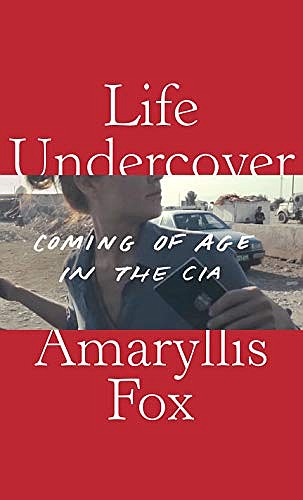When Amaryllis Fox was a child, she took “world-wandering” trips with her father, who worked as a consultant for foreign governments.
At 12, she and her brother lived for a time in Russia, where they “ran feral” in Moscow and St. Petersburg while their father met with Mikhail Gorbachev and other Soviet officials. She later lived in London, then settled in Washington, D.C., with her mother after her parents separated.
Always on a quest for answers, Fox was haunted by the death of her best friend in the attack on Pam Am Flight 103 over Lockerbie, Scotland. In response, her father taught her to read the London Times, saying “You have to understand the forces that took her. It will seem less scary if you do.” Her youthful questing nature would lead to career choices she made as an adult.
After high school, she used money her mother had set aside for a prom dress and traveled to Burma and Thailand, spending a year working with refugees and with an underground newspaper as a writer and investigator. During that period, she interviewed Aung San Suu Kyi, who was imprisoned in her home, and smuggled the videotaped interview out of the country — but not before being interrogated and imprisoned by the military.
With this worldly background, she entered Oxford where she studied international law and theology, and became immersed in global issues and active with Amnesty International. She also spent a summer in Bosnia, helping children orphaned in the Srebenica massacre. Devastated by the brutal death of her writing mentor, Daniel Pearl, who was beheaded in Pakistan during her final undergraduate year, she decided to continue her work for world peace and enrolled in a master’s program in conflict and terrorism at Georgetown University’s School of Foreign Service.
As a graduate student, she developed an algorithm that predicted where in the world a terror cell might find a safe haven. Her “algo” came to the attention of the CIA, and she was recruited to work as an analyst for the agency at the age of 21. There, she read daily classified cables relating to southeast Asia and an al-Qaida affiliate. Her analyses resulted in a product for Congress and the presidential daily brief. Given her impressive intellect and technical skill, she was obviously a benefit to the agency and was soon moved to the Iraq desk at the counterterrorism center.
In between all this activity, she managed to complete her doctorate degree. She also married a college friend, but all the secrecy needed on her job precluded marital intimacy. The marriage was short-lived.
At 22, she was fast-tracked for entry to “the Farm,” the CIA’s school for spies, where she spent six months learning espionage trade-craft, from surveillance techniques and weapons training to recruiting assets and creating a cover. Her assignment after that rigorous training was a coveted one — a spy undercover as an art dealer in Shanghai. She was slated to spend six years in that role. By that time, she was married again, to a fellow agency member, a marriage “suggested” by the agency. Her husband had his own assignments, apart from her art dealings, and they were monitored in their home, both by camera and by a Chinese government “maid.”
Fox’s memoir, “In Life Undercover: Coming of Age in the CIA,” is filled with the twists and turns and danger of her many undercover jobs: meetings with arms dealers, tracking black market nuclear materials, cultivating sources and tracking brutal killers — all with no backup. Those scenes read like novels by le Carré or Forsyth.
What was most memorable to me throughout her fascinating stories and exploits was the secrecy and pretense required by the nature of her job — and the loneliness. Most of the time, both she and her husband were living lies, which affected their relationship as well as the child they had early in their marriage. As she said, “reality gets more and more distant.”
The conflict between her job and her ideals, and the ethics of the work she did, culminated in her resignation from the agency after almost 10 years of dedicated work. Today, she’s 38, married again with another child, making documentaries, doing news analysis and writing books for young people.
Madeline Matson is a reference and adult programming librarian at Missouri River Regional Library.

